Mitochondrial matrix - Study guides, Class notes & Summaries
Looking for the best study guides, study notes and summaries about Mitochondrial matrix? On this page you'll find 1346 study documents about Mitochondrial matrix.
Page 3 out of 1.346 results
Sort by
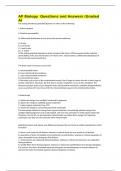
-
AP Biology Questions and Answers (Graded A)
- Exam (elaborations) • 70 pages • 2024
- Available in package deal
-
- $16.59
- + learn more
AP Biology Questions and Answers (Graded A) The resting membrane potential depends on which of the following? I. Active transport II. Selective permeability III. Differential distribution of ions across the axonal membrane A. III only B. I and II only C. II and III only D. I, II, and III D The resting potential depends on active transport (the Na+K+-ATPase pump) and the selective permeability of the axon membrane to K+ than to Na+, which leads to a differential distribution of ...
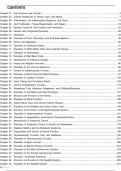
-
TEST BANK ESSENTIALS OF PATHOPHYSIOLOGY (4TH EDITION BY PORTH)
- Exam (elaborations) • 263 pages • 2024
-
- $15.49
- 2x sold
- + learn more
TEST BANK ESSENTIALS OF PATHOPHYSIOLOGY (4TH EDITION BY PORTH) CONTENTS Chapter 01 - Cell Structure and Function .......................................................................................................................... 2 Chapter 02 - Cellular Responses to Stress, Injury, and Aging .......................................................................................... 7 Chapter 03 - Inflammation, the Inflammatory Response, and Fever ..............................................
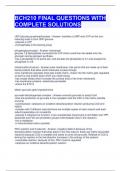
-
BCH210 FINAL QUESTIONS WITH COMPLETE SOLUTIONS
- Exam (elaborations) • 37 pages • 2024
- Available in package deal
-
- $13.29
- + learn more
BCH210 FINAL QUESTIONS WITH COMPLETE SOLUTIONS UDP glucose pyrophosphorylase - Answer--transfers a UMP onto G1P on the non-reducing ends to form UDP-glucose -requires a UTP -2 phosphates is the leaving group phosphoglycomutase - Answer--isomerase glucose 1,6 biphosphate converted into G1P which could then be added onto the glycogen during glycogen synthase. -has a phosphate in its active site, and donates the phosphate to C1 and accepts the phosphate on C6 mitochondria structure - An...
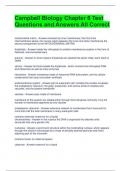
-
Campbell Biology Chapter 6 Test Questions and Answers All Correct
- Exam (elaborations) • 5 pages • 2024
- Available in package deal
-
- $13.39
- + learn more
Campbell Biology Chapter 6 Test Questions and Answers All Correct mitochondrial matrix - Answer-enclosed by inner membranes; the first is the intermembrane space, the narrow region between the inner and other membranes the second compartment is the MITOCHONDRIAL MATRIX thylakoids - Answer-inside the chloroplast is another membranous system in the form of flattened, interconnected sacs granum - Answer-in some regions thylakoids are stacked like poker chips; each stack is called stroma -...
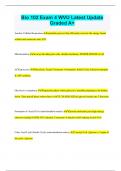
-
Bio 102 Exam 4 WVU Latest Update Graded A+
- Exam (elaborations) • 11 pages • 2024
- Available in package deal
-
- $9.99
- + learn more
Bio 102 Exam 4 WVU Latest Update Graded A+ Aerobic Cellular Respiration metabolic process that efficiently converts the energy found within food molecules into ATP Mitochondrion in most all eukaryotic cells, double membrane, POWER HOUSE of cell ACR processes Glycolysis, Acetyl Coenzyme A formation, Krebs Cycle, Electron transport & ATP synthase Glycolysis (cytoplasm) Preparatory phase where glucose is unstable preparing to be broken down. Then payoff phase where there is 4ATP, ...
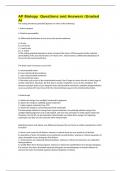
-
AP Biology Questions and Answers (Graded A)
- Exam (elaborations) • 70 pages • 2024
-
- $16.59
- + learn more
AP Biology Questions and Answers (Graded A) The resting membrane potential depends on which of the following? I. Active transport II. Selective permeability III. Differential distribution of ions across the axonal membrane A. III only B. I and II only C. II and III only D. I, II, and III D The resting potential depends on active transport (the Na+K+-ATPase pump) and the selective permeability of the axon membrane to K+ than to Na+, which leads to a differential distribution of ...
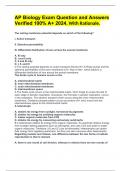
-
AP Biology Exam Question and Answers Verified 100% A+ 2024, With Rationale.
- Exam (elaborations) • 82 pages • 2024
- Available in package deal
-
- $21.49
- + learn more
AP Biology Exam Question and Answers Verified 100% A+ 2024, With Rationale. The resting membrane potential depends on which of the following? I. Active transport II. Selective permeability III. Differential distribution of ions across the axonal membrane A. III only B. I and II only C. II and III only D. I, II, and III D The resting potential depends on active transport (the Na+K+-ATPase pump) and the selective permeability of the axon membrane to K+ than to Na+, which leads t...
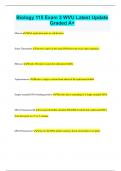
-
Biology 115 Exam 3 WVU Latest Update Graded A+
- Exam (elaborations) • 12 pages • 2024
- Available in package deal
-
- $9.99
- + learn more
Biology 115 Exam 3 WVU Latest Update Graded A+ Meiosis DNA replication prior to cell division Sister Chromatids are two copies of the same DNA(have the exact same sequence) Helicase Breaks H-bonds to open the replication bubble Topoisomerase Breaks a single covalent bond ahead of the replication bubble Single-stranded DNA binding proteins Prevents the re-annealing of a single stranded DNA DNA Polymerase III recognized double stranded DNA/RNA hybrid and synthesized DNA from ...
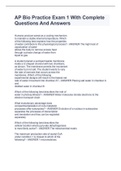
-
AP Bio Practice Exam 1 With Complete Questions And Answers
- Exam (elaborations) • 9 pages • 2023
- Available in package deal
-
- $11.99
- 2x sold
- + learn more
Humans produce sweat as a cooling mechanism to maintain a stable internal temperature. Which of the following best explains how the properties of water contribute to this physiological process? - ANSWER The high heat of vaporization of water allows the body to remove excess heat through a phase change of water from liquid to gas A student placed a semipermeable membrane inside a U-shaped channel with two chambers, as shown. The membrane permits the movement of water but not salt. The...
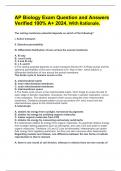
-
AP Biology Exam Question and Answers Verified 100% A+ 2024, With Rationale.
- Exam (elaborations) • 82 pages • 2024
-
- $17.49
- + learn more
AP Biology Exam Question and Answers Verified 100% A+ 2024, With Rationale. The resting membrane potential depends on which of the following? I. Active transport II. Selective permeability III. Differential distribution of ions across the axonal membrane A. III only B. I and II only C. II and III only D. I, II, and III D The resting potential depends on active transport (the Na+K+-ATPase pump) and the selective permeability of the axon membrane to K+ than to Na+, which leads t...

$6.50 for your textbook summary multiplied by 100 fellow students... Do the math: that's a lot of money! Don't be a thief of your own wallet and start uploading yours now. Discover all about earning on Stuvia


